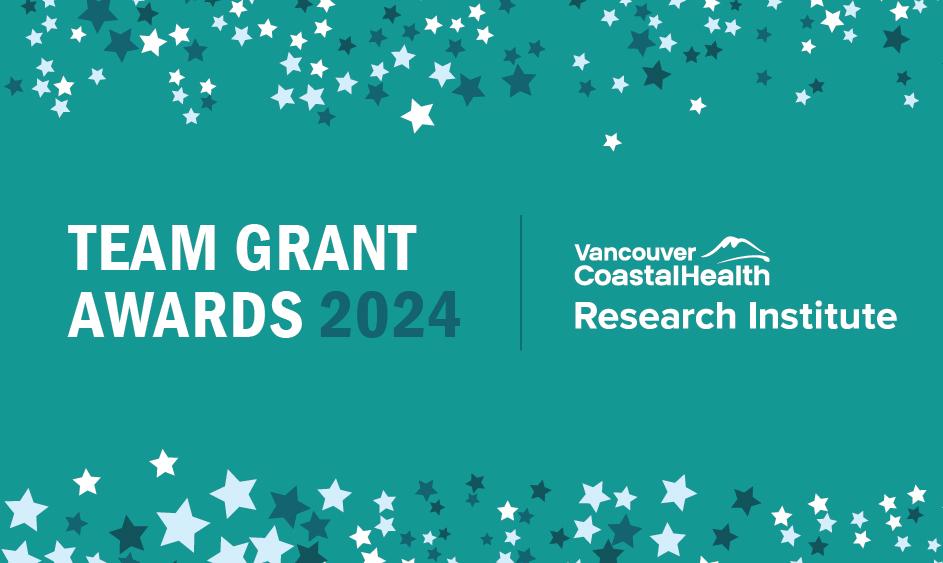
Congratulations to this year's recipients of the Vancouver Coastal Health Research Institute Team Grant Awards!
Vancouver Coastal Health Research Institute (VCHRI) is proud to support research through Team Grant projects, which enable VCH staff and clinicians to collaborate with experienced investigators to share knowledge and build connections. By supporting practice-based research projects, these grants contribute to the improvement of health care delivery addressing the pressing challenges in health care.
The 2024 VCHRI Team Grant recipients are:
- Dr. Daljeet Chahal, transplant hepatologist at Vancouver General Hospital (VGH) and clinical assistant professor at the University of British Columbia (UBC)
- Wynne Chiu, clinical nurse specialist at St. Paul’s Hospital
- Dr. Ulrike Dehaeck, director of the Vulvar Disease Clinic at the BC Centre for Vulvar Health and clinical assistant professor at UBC; mentored by Dr. Katrina Bouchard, research director of the BC Centre for Vulvar Health and assistant professor at UBC
- Dr. Jeremy Ho, medical oncologist at Richmond Hospital
- Allana LeBlanc, clinical nurse specialist at VGH
- Dr. Siri Reinbold, psychiatrist for the Richmond Metabolic and Bariatric Surgery program
- Joanne Sadler, injury prevention lead for VGH Trauma Services
 Optimizing organ donation from patients undergoing MAID
Optimizing organ donation from patients undergoing MAID

Project title: Characterizing the cerebrovascular physiology of circulatory death during medical assistance in dying to optimize organ donation opportunities
Funded by: Transplant Research Foundation of BC, VGH & UBC Hospital Foundation and VCHRI
In recent years, donation opportunities and grafts procured have increased due to the emerging practice of medical assistance in dying (MAID) in Canada. However, little is known regarding the physiology of circulatory death for MAID patients undergoing donation after cardiac death. As such, organ donation practices for critically ill patients are extrapolated to MAID patients, which could be resulting in suboptimal outcomes due to physiological differences between the populations.
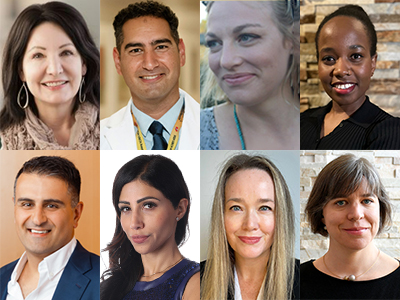
This project may help define criteria that could be used to increase organ donation from such patients and could potentially alleviate transplant organ demand, as evidenced by the increasing number of Canadians on transplant waitlists.
“Given the increasing MAID population at VCH, this project has immediate importance,” says Chahal. “Not only would this be an enabling criterion allowing increased organ donation from MAID patients, it would also reduce graft ischemia and improve graft and recipient outcomes.”
 Implementing a peer mentorship program to support heart transplantation patients
Implementing a peer mentorship program to support heart transplantation patients

Project title: Improving the journey of care of people with advanced heart failure and transplant: Implementation of a peer mentorship program in practice
Funded by: Transplant Research Foundation of BC and Providence Research
For patients with advanced heart failure, heart transplantation and ventricular assist devices — used to support blood flow from the heart’s lower chambers to the rest of the body — can be life-saving. Despite the improving outcomes associated with these treatments, the maze of bloodwork, diagnostic testing, consultations, medication adjustments and screening processes is associated with high levels of uncertainty and distress in patients and families as they adapt to new challenges during recovery.
Patients of the Heart Transplant Clinic at St. Paul’s Hospital have voiced their desire for peer-to-peer support and mentorship to improve their care experience.
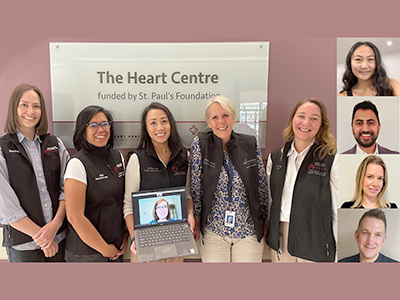
“This research addresses the significant psychological complications frequently experienced by cardiac transplant recipients,” says Chiu. “We have the unique opportunity to translate patient-oriented and innovative knowledge into practice and measure the impact of the PMP program on outcomes that matter most to patients and their loved ones.”
 Expanding patient education for management of vulvar lichen sclerosus
Expanding patient education for management of vulvar lichen sclerosus

Project title: Developing and testing a patient education video series for VLS
Funded by: VGH & UBC Hospital Foundation and VCHRI
Vulvar lichen sclerosus (VLS) is a chronic and incurable genital skin condition that negatively impacts quality of life. People with VLS often experience persistent sexual and psychological distress related to their condition and report receiving minimal education about these topics from health care providers. Evidence-based information for patients about managing VLS is lacking, and there is limited research examining the role of patient education in improving quality of life among affected patients.

“Despite the well-documented sexual and psychological health consequences of VLS, there are few empirically supported tools available to help patients manage VLS-related distress,” says Dehaeck.
“The results of our study will inform future research as well as expand educational resources offered across VCH to help improve patient care,” adds Bouchard.
 Evaluating a remote symptom monitoring tool for patients undergoing chemotherapy
Evaluating a remote symptom monitoring tool for patients undergoing chemotherapy

Project title: Impact of RESPONSe, a digital remote symptom monitoring program, on patient outcomes, health care utilization and cost of care for cancer patients undergoing chemotherapy at Richmond Hospital
Funded by: Richmond Hospital Foundation, VGH & UBC Hospital Foundation and VCHRI
Unfortunately, chemotherapy often causes a myriad of side effects that impact overall quality of life and can also lead to treatment interruptions, dose reductions or discontinuation. Monitoring these side effects effectively is crucial to optimizing treatment outcomes, but traditionally it is left to patients to monitor their symptoms and decide if they have a side effect severe enough to warrant contacting the cancer team. During early phases of treatment, they may not seek help until it is too late, which can lead to delayed symptom management or a need to seek help through the emergency room.
With the goal of providing proactive patient centered care, the Richmond Cancer Care Clinic has implemented the RESPONSe program: a digital remote symptom monitoring tool with symptom management nurse support for patients undergoing chemotherapy during the first six months of treatment.
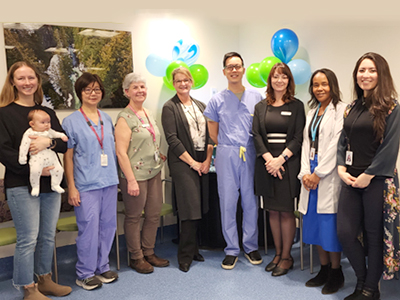
“Study results will contribute valuable insights to barriers and solutions in implementing digital health technologies in the Canadian context of cancer care as well as potential benefits to the patient and health care system in having such a program in place,” says Ho. “We hope that our findings will help inform further strategies in using digital health innovations to improve patient outcomes and health care efficiency within different health settings across VCH.”
Investigating rehabilitation interventions on the trajectory of patient recovery in the ICU

Project title: Feasibility of obtaining patient-reported outcomes following participation in an ICU-based early rehabilitation program for chronically critically ill patients
Funded by: VGH & UBC Hospital Foundation and VCHRI
Approximately five to 10 per cent of people admitted to an intensive care unit (ICU) will go on to develop chronic critical illness (CCI), defined as the need for mechanical ventilation or organ support in an ICU for longer than seven to 10 days. While patients with CCI represent a relatively small proportion of admissions to ICU, they contribute a disproportionate percentage of the total ICU patient days, representing a significant burden on health care resources.
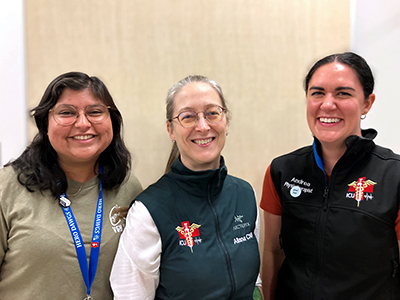
“Results from our study will be integral to planning rehabilitation services and facilitating early consultation to specialized care,” says LeBlanc. “By gaining a more fulsome understanding of the distribution of long-term outcomes, we can help to align care with patient values and empower clinicians to better assist patients in their recovery.”
 Supporting psychological health for bariatric surgery patients with group therapy
Supporting psychological health for bariatric surgery patients with group therapy

Project title: Exploring the impact of early post-operative supportive group psychotherapy in bariatric surgery patients
Funded by: Richmond Hospital Foundation, VGH & UBC Hospital Foundation and VCHRI
For those with severe obesity, nutritional and behavioral interventions alone are often ineffective for long-term weight loss maintenance and metabolic recovery. Bariatric surgery can be beneficial for this population, but up to one third of patients will eventually experience weight regain. Additionally, some patients who undergo bariatric surgery struggle with significant psychiatric complications including depression, anxiety, eating disorders and substance use.

“For bariatric patients, expectations for life after surgery can have a significant impact on their post-operative quality of life, including physical and mental health outcomes,” says Reinbold. “The findings of our study could help shape our current medical care model to better fit patient-identified needs and improve overall health outcomes across many fields.”
 Understanding the impact of social risk factors on injury incidence and outcomes
Understanding the impact of social risk factors on injury incidence and outcomes

Project title: Breaking the injury cycle: Understanding the impact of the social determinants of health on trauma care and injury recidivism
Funded by: VGH & UBC Hospital Foundation and VCHRI
Increasingly, research has indicated that significant injury-related inequities exist based on the social determinants of health (SDH), placing some people at greater risk for injury incidence and outcome than others. While a significant proportion of the patient population lives with social risk factors for injury, data is limited. This gap in understanding can hinder clinicians’ ability to tailor treatment and discharge plans specific to each patient.
To address this knowledge gap, the study team will pilot an SDH screening tool for use through VGH Trauma Service. Data collected will be used to characterize the social and economic risk factors associated with injury, injury recidivism and patient outcomes, as well as assess the use of SDH screening to better support patients in discharge planning.
“While we know about our patients’ injuries and their course of treatment from data in the BC Trauma Registry, there is little collected data that can tell us about a patient’s social and economic needs,” says Sadler. “By better understanding the social circumstances that contribute to injury, we can lead, support and advocate for public health and quality improvement initiatives that will ultimately reduce injury and improve care for patients as they transition from hospital to home.”
Team Grants are made possible with the generous support of the VGH & UBC Hospital Foundation, the Richmond Hospital Foundation, Providence Research and the Transplant Research Foundation of BC in partnership with VCHRI.


